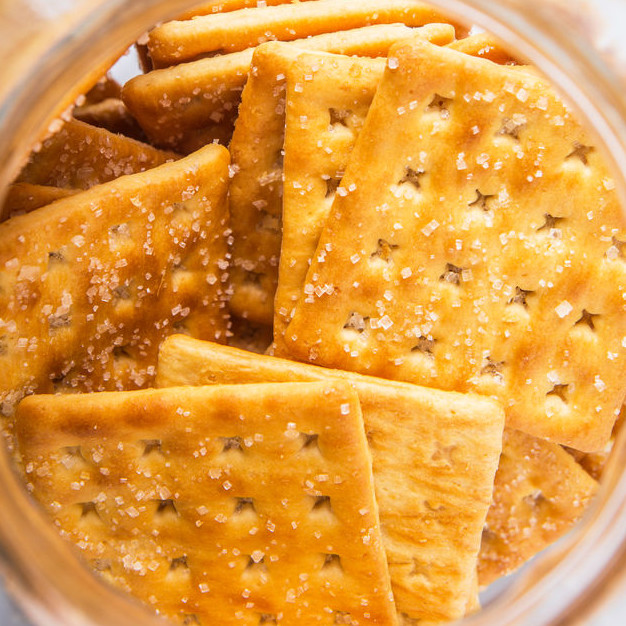
Ammonium Bicarbonate
Also known as baker’s ammonia or salt of hartshorn
What is Ammonium Bicarbonate?
Ammonium bicarbonate, NH4HCO3, is a common leavening agent which releases CO2 without the need for an acid. Unlike baking powder or soda, it does not leave an alkaline taste, characteristic of soda or baking powder.
This ingredient is not used in high volume cakes, but mostly in:
- Extra crisp cookies
- Cream-puff pastries
- Crackers
Origin and Commercial Production
Historically, ammonium bicarbonate was produced in Northern Europe from dry distillation of hair, horn or other nitrogenous organic matter. Today, it is produced commercially by dissolving carbon dioxide in ammonia:
NH4OH + CO2 → NH4HCO3
Properties1
- Colorless or white crystals
- Faint odor of ammonia
- Melting point: 95 °F (35 °C)
- Solubility: Freely soluble in water. Insoluble in ethanol
- Decomposes above 34 °C with formation of ammonia gas
Function
Ammonium bicarbonate can release ammonia and carbon dioxide, leavening gases without reacting with a leavening acid.2 It spontaneously decomposes into this ingredient and ammonia first and in a later step into ammonia and carbon dioxide gas:
NH4HCO3→ NH4HCO3+NH3
NH4HCO3→H2O+CO2+NH3
Baking soda can replace this ingredient in low-moisture products like dry cookies or some cracker products although this may not reproduce the unique texture.
Application
Ammonium bicarbonate is listed in Old World baking recipes. Especially, in Scandinavian gingerbread, Polish ammonia cookies and traditional German Spekulatius Christmas cookies.
Advantages of using this in baked goods include:
- The absence of alkaline taste residue often encountered with sodium bicarbonate
- It doesn’t affect the pH of the baked goods
In high moisture baked goods (in excess of 5%), ammonium bicarbonate may lead to the development of ammoniacal flavor. This is why it’s most suited for low-moisture products such as biscuits, crackers, cookies, and waffle cones.3
Typically, this ingredient is mixed in with the liquid ingredients to ensure its dissolution prior to incorporating into the dry mix. In some formulas, it is used in combination with 30-50% baking soda.
FDA Regulation
Ammonium bicarbonate is considered as ‘GRAS’ by FDA under 21CFR184.1135.4
References
- Ammonium Bicarbonate (Compound). https://pubchem.ncbi.nlm.nih.gov/compound/Ammonium-bicarbonate#section=Experimental-Properties. Accessed by Dec 19. 2019.
- Vetter, J.L. LEAVENING AGENTS. In Encyclopedia of Food Sciences and Nutrition (Second Edition). 2003. Pp:3485-3490. Elsevier.
- Tiefenbacher, K. F. After-Bake Technology of Crisp Wafers and of Soft Waffles. In Wafer and Waffle. 2017. pp: 539–586. Elsevier.
- CFR – Code of Federal Regulations 21CFR184.1135. Accessdata. Fda. gov. April 01. 2019. https://www.accessdata.fda.gov/scripts/cdrh/cfdocs/cfcfr/CFRSearch.cfm?fr=184.1135. Accessed by Dec 19. 2019.

